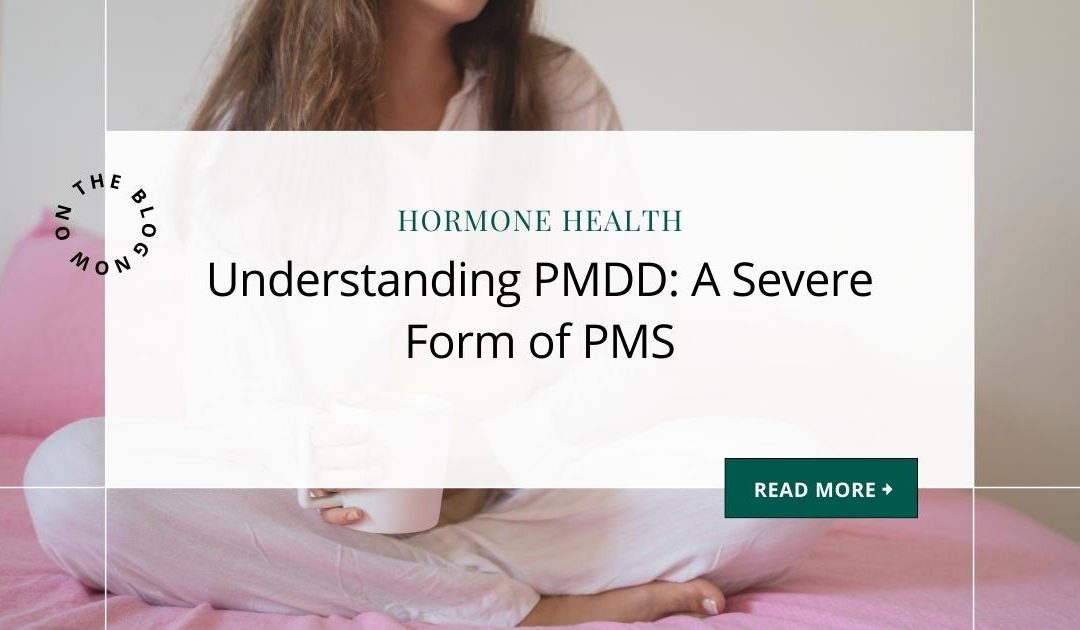Pre-menstrual Dysphoric Disorder, or PMDD, is a more severe form of premenstrual syndrome (PMS).
It’s characterised by severe mood and behaviour changes after you ovulate and leading up to your period, usually occurring at least 7 days prior. The symptoms will often completely dissipate as soon as the period arrives.
Symptoms of PMDD
You must experience at least 1 of the 4 core symptoms listed below in the 7 days prior to your period:
- Marked affective lability (mood swings e.g suddenly tearful or increased sensitivity of rejection)
- Marked irritability or anger
- Markedly depressed mood
- Marked anxiety or tension
One of more of the following must also be present:
- Decreased interest in usual activities
- Difficulty in concentration
- Marked lack of energy
- Marked change in appetite e.g overeating specific foods
- Insomnia
- A sense of being overwhelmed or out of control
- Physical symptoms such as breast tenderness or swelling, weight gain or joint pain
What’s happening inside your body
PMDD is connected to hormones like progesterone and estrogen, which can work as chemicals in your brain.
These chemicals affect parts of your brain that control your mood, thoughts, and actions. They also impact other brain chemicals like serotonin, GABA, and dopamine.
In PMDD, the brain can be more sensitive to these hormone changes, which can lead to the symptoms you experience.
Other hormones involved in mood changes associated with PMDD include both serotonin and melatonin.
Serotonin: The Mood Regulator
Before your period, changes in your serotonin levels, which play a key role in mood regulation, can occur. This is largely due to a decrease in a hormone called oestradiol.
Oestradiol contributes to serotonin regulation which is important in areas of the brain linked to emotion and behavior.
It also boosts the production of tryptophan hydroxylase, an enzyme responsible for converting tryptophan into serotonin.
When oestradiol levels drop, it can disrupt serotonin balance, impacting your mood.
Melatonin: Your Sleep Hormone
Melatonin, the hormone responsible for regulating your sleep, can also be affected in PMDD.
This can be attributed to lower serotonin levels, which are crucial for melatonin production. When melatonin is out of balance, it can worsen your mood.
Causes of PMDD
Several factors can contribute to an increased risk of developing PMDD:
- Genetics: If there’s a history of PMDD in your family, your genetic makeup might predispose you to this condition.
- Trauma: A history of traumatic experiences, particularly emotional abuse, has been associated with a higher likelihood of experiencing PMDD. While the underlying reasons are multifaceted, it’s thought that the dysregulated activity of the HPA axis and subsequent changes in neurotransmission might be responsible.
- Chronic Stress: Individuals with PMDD often exhibit a maladaptive response to stressors, linked to a flattened diurnal cortisol slope. This might make everyday events seem more stressful and heighten negative emotions during the luteal phase. Chronic stress also alters the composition of GABA-a receptors, reducing their normal functioning. This can partially explain why rising levels of allopregnanolone (ALLO) lead to increased stress reactions.
- Other Mental Health Conditions: If you have bipolar disorder, ADHD, or other mental health conditions, you might be at a higher risk of developing PMDD.
Natural Medicine Considerations for PMDD
- Saffron: A natural supplement, saffron, when taken twice a day over two menstrual cycles, has been shown to enhance mood in individuals with PMDD. This is thought to be due to the influence of saffron’s active constituents, crocin and safranal, which inhibit the reuptake of dopamine, norepinephrine, and serotonin, contributing to mood improvement.
- Adaptogenic herbs: Certain herbal medicines with adaptogenic and nervine actions, like Withania somnifera and Chamomila recutita, may be beneficial for PMDD due to the observed HPA axis dysfunction in affected women.
- Nutrition: Choosing the right foods, especially complex carbohydrates, can help enhance your mood during the luteal phase. These foods aid in the synthesis of serotonin in the brain, which is essential for maintaining a positive mood.
- Lifestyle: Spending time in natural sunlight or using a light box for around 30 minutes in the evening during the luteal phase can be an effective way to boost your mood and reduce PMDD symptoms. Light therapy has demonstrated its effectiveness in various mental health conditions, including PMDD.
Remember, these approaches offer scientifically grounded methods to manage PMDD, but it’s essential to consult with a healthcare professional to determine the best course of action for your specific situation.
Blog Posts You May Like

Get Your Fibre Fix: The Key to Hormone Health and Happy Guts
Are you struggling with hormonal imbalances or digestive issues? Believe it or not, the solution could be as simple as adding more fibre to your diet. Fibre is a type of carbohydrate found in plant foods that not only supports gut health but also plays a crucial role...

4 Steps to Treat IBS Naturally
It can be incredibly disheartening when you hear your doctor tell you to simply live with the symptoms of Irritable Bowel Syndrome (IBS). In fact, for many individuals, this can be one of the most frustrating and discouraging experiences they face while trying to...

A Clients Story – Finding the Root Cause to Chronic Nausea & It’s Connection To Hormonal Health
"My health journey began in 2002 after contracting gastro from my partner at the time. After being violently ill for about 10 hours it took about 5 days before I could eat again and before I felt "ok" again. I never truly felt like myself or "normal" after that. The...


